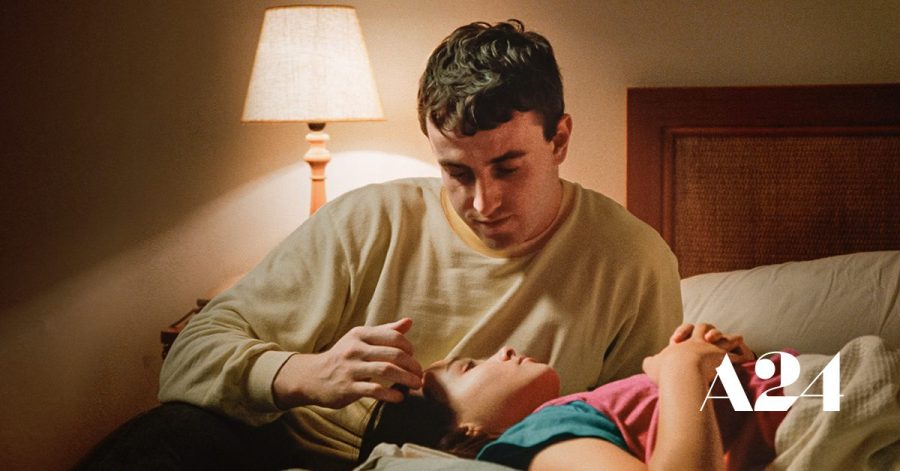Charlotte Wells’ Debut Film ‘Aftersun’: Melancholic Childhood and Bittersweet Reminiscence
December 5, 2022
There comes a point in everyone’s life when everything seems to shift, when you move from one state of development to another. You are no longer a child, yet you long for the days of your childhood. The time spent frolicking in the sun, swimming in lakes and singing at the top of your lungs with so much passion that you couldn’t care less if you were off key. Nothing was serious unless it had to be and you looked at the world with constant newfound wonder. You relish in the memories you make with your parents despite the problems plaguing the adults around you. You look into your parents’ eyes and you barely see pain shrouded in their enthusiasm but you know it’s still there. You may not be able to see it outright, but somewhere in the periphery of your adolescence you know that the adults in your life have a weight on their back that you can’t fully comprehend. This is a weight that might carry on to you, but you savor these sweet moments nonetheless. These fleeting moments of bliss are everything.
Crashing Waves of Memories Long Gone
“Aftersun” is a curious film as when it first starts it feels like just another nostalgic childhood story. The film intercuts the main sequence with glimpses of the main character Sophie (Celia Rowlson-Hall) as an adult standing in a dark dance club with flashing lights washing over the crowd. The moments are short and slightly disorienting but serve a distinct purpose, as you see that she is imagining her father in her memories dancing a few feet away from her. This, as we find out later on, is important because it’s the last time she sees her father truly happy and unbridled with joy. However, there is a specific pain to this reminiscing as the film continues, a pain that settles quietly under your skin and sinks into your bones. It inundates you with a feeling everyone knows too well.
Melancholic Childhood Dappled with Sunshine
The feeling of losing someone who was so integral to every part of your existence and looking back into the past at family home videos on a grainy tape recorder is precisely the feeling that washes over you while watching this film. The shots are filled with sunny vistas and bright blue skies, capturing the feeling of vacation through the lens of a child.
Towards the second half of the film, you find that all is not well. Sophie’s father, Calum (Paul Mescal), seems to be grappling with something dark. He does tai-chi in public, makes jokes with his daughter about the other vacationers and always offers to pay for things even though he doesn’t have the money. While a young Sophie (Frankie Corio) knows this, she isn’t naive to her father’s problems just because she is a child.
Writer and director Charlotte Wells writes children with raw honesty and respect, much like she does for the adults in the film. The last time that Sophie presumably sees her father happy is a heart-wrenching scene where Calum dances to “Under Pressure” by Queen on an outdoor patio. It’s the chemistry and performance between Corio and Mescal that help elevate this film and subsequently wreck your emotional core in the same breath.
Absence and Loss
By the end of the film, we see that Calum isn’t the happy-go-lucky, free-flowing guy that everyone sees him as. In a scene where he sits with his back towards the audience and weeps by himself in an empty hotel room you get the feeling that he’s grappling with his own demons. Yet, the film doesn’t spell out its true devastation and leaves it up to the audience to fill in the blanks.
In the last scene, we see adult Sophie, sitting alone in her living room, facing a mirror while holding her childhood video camera. It then cuts to her father holding the same camera in his hands in an empty hallway and just like that, the film ends like the crashing of an ocean tide.







